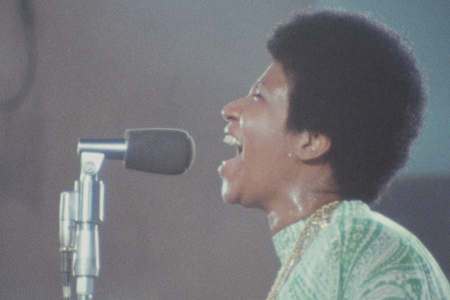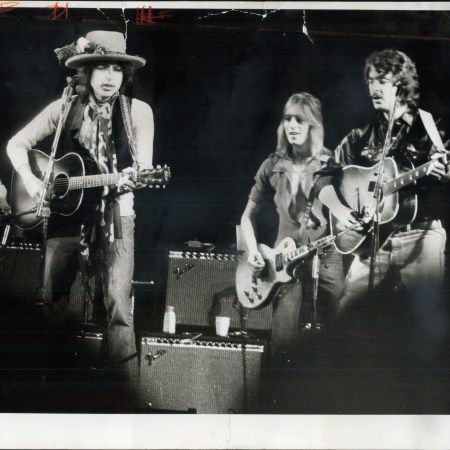The best music documentaries are never just about the music. As fans, we’re always curious about the nuts and bolts of how our favorite songs get made, but a great film needs a narrative. How does the record we’re watching come together fit into a broader career arc, and how does the life of the artist crafting it — their childhood trauma, their adult heartbreak, their personal quirks and influences — impact their work?
Of course, the best music is never just a series of notes scrawled on a page, either. As Jason Isbell describes at one point in his new documentary Jason Isbell: Running With Our Eyes Closed (out now on HBO Max), “Hearing a song that really moves you is as if you accidentally stumbled on somebody’s diary and it was exactly like yours. You would say, ‘Oh my god, there’s one person who had the same feelings that I did.’ And all of us are kind of walking around thinking, ‘Man, am I weird? Am I the only one who feels this way?’ And then when somebody reaches in and says, ‘No no, I’m with you,’ that’s it. That’s all it is.” A great song doesn’t require any additional context — but a great music documentary provides it anyway.
Perhaps that’s why the music almost feels secondary in Running With Our Eyes Closed. Director Sam Jones (also responsible for the 2002 Wilco documentary I Am Trying to Break Your Heart) began filming in 2019 as Isbell and his band the 400 Unit — including Amanda Shires, who pulls triple duty as fiddler, backup vocalist and Isbell’s wife — worked on recording Reunions. Jones is careful to include plenty of scenes that highlight the Alabama-born musician’s creative process, including his insistence on waiting to play his songs for his bandmates (save for Shires) for the first time moments before they press record. But at the film’s core is the marriage between Isbell and Shires and the strain placed upon it as the two struggle to balance their relationship as coworkers with their relationship as husband-and-wife.
Dedicated fans already know the lore: Isbell, a teen guitar prodigy and a hell of a songwriter, gets his first taste of success as a member of the Drive-By Truckers before his alcoholism spirals out of control and forces that band to give him the boot. While working to get a solo career off the ground, he starts dating Shires, who inspires him to finally get sober and write Southeastern, his 2013 breakthrough album. Shires insists he stay sober for a full year before she’ll marry him, the pair get hitched the same year Southeastern comes out, and several years later she gives birth to their daughter, Mercy. It’s a happy, inspiring love story. The couple has been open, however, about the fact that recording Reunions brought them to the brink of divorce.
That tension is evident as we watch them in the studio together in Running With Our Eyes Closed. Isbell gets snippy with her when she points out a grammatical inconsistency in the track the doc takes its name from before eventually realizing she was right and changing the lyric. (As he tells the camera later, “Once the songs get past her, nobody scares me. Nobody. I don’t give a shit. I know it’s right.”) Later, we see Shires take offense to his comment about her fiddle being too loud. By and large, though, the majority of their fighting happens off-camera, with Jones just giving us fleeting glances at the aftermath: A hushed exchange between the pair in which Isbell admits he won’t be able to focus on recording his next song until they talk through some unseen conflict and Shires responds, “I’ll send you a text.” Isbell matter-of-factly admitting to producer Dave Cobb that he can’t rehearse a part at home that night because he’s currently staying at a hotel. A frustrated Isbell getting up and leaving during one of their interview segments after Shires hits a nerve by pointing out that he “needs a lot of space.”
We don’t need to see any onscreen screaming matches to understand that we’re watching a painfully rough patch in their marriage, and Jones fills in the gaps by having a tearful Shires read an email she sent to Isbell during the period when they weren’t speaking to each other to the camera. The director’s most effective choice, however, is his decision to tell the story non-linearly. Anyone vaguely familiar with the couple already knows that they were able to work through their differences and remain married — saved, perhaps, by the forced quality time of the COVID-19 lockdown. But aren’t all marriages full of peaks and valleys? By mixing in the little winks, smiles and loving glances exchanged onstage with the harder moments, Jones reminds us that there’s no such thing as a fairytale love story. “He fell in love with her, she inspired him to get sober, and they lived happily ever after” is a reductive way of looking at it. Just like Isbell still has to wake up every morning and decide not to drink — a decision he admits in one scene he came precariously close to abandoning during the toughest moments of the pandemic — he and Shires have to choose every day to keep being together, even when times are tough.
Why It Took Nearly 50 Years to Release This Aretha Franklin Concert Film
Producer Alan Elliott talks with InsideHook about Amazing Grace, the best concert film that you’ve never seenEven the sections of the doc that aren’t directly related to their marriage still feel relevant to it. The interviews with Isbell’s parents about the impact their divorce had on him as a young teen give us glimpses of the mistakes it’s clear he’s actively working to avoid in his own marriage decades later. The doc’s most moving scenes, however, are the ones that connect his life with Shires to his music. After their daughter Mercy visits them in the studio, we watch Isbell and Cobb both get choked up as he records “Letting You Go,” the gorgeous song he wrote for her. It’s obvious how much the family he and Shires have built together means to Isbell and the way that love informs all of his best work.
The most glaring example of this would of course be “Cover Me Up,” the Southeastern track that chronicles his romance with Shires and subsequent sobriety. But one of the film’s most fascinating moments comes when Shires admits that “there are parts of ‘Cover Me Up’ that I still don’t like to hear, but I listen anyway.” (She doesn’t go into any specifics, but if one had to venture a guess, it probably has something to do with the “I put your faith to the test/When I tore off your dress/In Richmond on high” line.) Eventually, Isbell comes to the revelation — more than 10 years after the fact — that some of the moments he sings about were in fact deeply traumatic to her, that while drunk, he occasionally made her feel “in danger.” He doesn’t go into specifics either, except to say, “I remember my perspective, I wasn’t going to hurt anybody, but my perspective wasn’t the only one.”
Thanks to Running With Our Eyes Closed, we’ve now got another new perspective — that of an outsider looking in on the highs and lows of a beautiful union and the music they inspire — and it makes for pretty compelling viewing.
This article appeared in an InsideHook newsletter. Sign up for free to get more on travel, wellness, style, drinking, and culture.

























